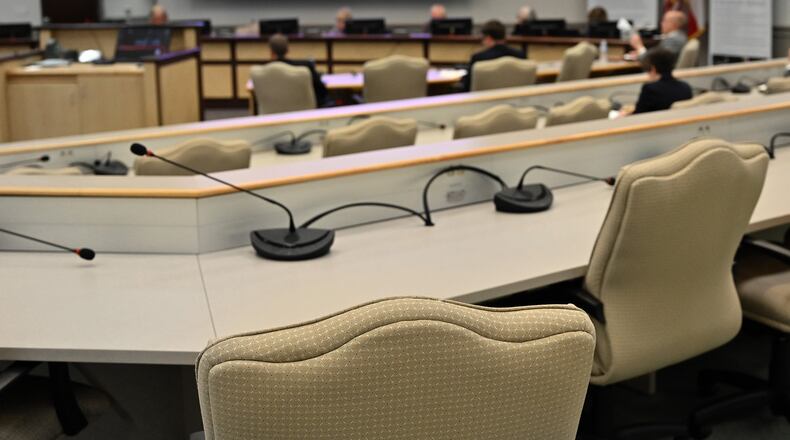The coronavirus is wreaking havoc on municipal governments’ ability to hold public meetings and both elected leaders and experts say a solution all can agree on is unlikely to come anytime soon.
As COVID-19 has marched across the nation, metro Atlanta school boards, county commissions and city councils — among other governmental bodies — have struggled with how to handle public meetings when it’s dangerous for citizens to show up.
Some cancelled meetings within hours or days of the Centers for Disease Control and Prevention guidance against gatherings of 50 people or more. Others moved forward with schedule meetings but encouraged the public to stay away because of the risk.
A handful, such as the Fayette County Commission, called special meetings with less than the 24 hours advanced public notice mandated by law. Leaders said the move is allowed in emergencies and necessary to close governmental offices or put restrictions on access to nursing facilities as the coronavirus imploded in the U.S.
Experts said figuring out a uniform public meetings strategy during the coronavirus crisis is crucial to keeping government transparent. Putting off a meeting or two may be acceptable in the early stages of the pandemic, but it’s not a long-term fix. And when the meetings resume, citizens have a right to have input.
"The access part does not go away," Sarah Brewerton-Palmer, an attorney on the board of the Georgia First Amendment Foundation, said of the public's ability to participate in open government meetings. "The logistical challenge of getting there is a different question. Everybody is just going to have to do their best and we will work toward solutions that work for each municipality."
That challenge has grown exponentially as new guidance or rules around the coronavirus — which happen daily if not almost hourly — has forced leaders to make snap decisions the public may not be aware of until long after they have been put in place, the experts said.
Many communities, from Atlanta to Lawrenceville, have enacted emergency powers, giving leaders broad authority during the coronavirus crisis. That has resulted in the banning of in-person dining in restaurants, bar closings and a curfew.
John Clayton Thomas, a public meetings expert and professor at Georgia State University’s Department of Public Management and Policy, said finding alternate options to gatherings where citizen health could be in danger makes sense. But he cautioned that leaders must narrowly focus their meeting agendas to items don’t require public input otherwise they are ignoring the spirit of good governance.
“It doesn’t seem to me that it is good public health practice to be holding public meetings [during a pandemic],” he said. “On the other hand, it’s not good governmental practice then to make rezoning decisions without providing some vehicle for public input.”
Some municipalities have tried to split the difference. They have pushed ahead with public meetings, but have allow residents to email comments during live-streamed meetings.
The results have been mixed.
“The feedback we got from several of the residents was that they liked it,” said Sharon Kraun, the spokeswoman for the city of Sandy Springs, which on Tuesday streamed its first-ever City Council meeting on its website and on Facebook Live. “They could see the presentations and they could hear what was going on.
“The Facebook Live was a little harder to hear because the room we had was not miked as well [as other parts of the room],” she said. “But we put that together last minute.”
Others, such as Clayton County, are considering shelving public comments altogether as they go to virtual meetings.
“We probably will have to suspend public comment if we go to virtual meetings because there really is no way to do it,” Clayton County Commission Chairman Jeff Turner said.
He likes the idea of using Facebook Live as a way to get public feedback, but is concerned it can’t be controlled and could get out of hand.
“We want to make sure the rules are being followed just as if we were in person,” he said. “I don’t want anything to turn into a circus.”
Joe Sorenson, a spokesman for Gwinnett County, said everyone is wrestling with the path forward. The Gwinnett Commission recently used a web-conference hosting service for one of its meetings that ran into issues because so many people have turned to the Internet to communicate.
“We’re all taking it one day at a time,” he said.
Technology expert David Barton said municipalities will have to step up their IT game in this new normal. The streaming that most provide to the public of meetings is rudimentary at best, with poor camera placement, dimly lit rooms and often unreadable presentations on issues of community importance because cameras are too far away.
Add to that recent reports that bandwidth could quickly become a problem because of the impact of more parents and children working or studying at home and you have a recipe for disaster, said Barton, a managing director of accounting firm UHY Advisors who specializes in technology risk and compliance.
“There are a lot of challenges and most IT professionals at government agencies are swamp,” he said. “Doing that kind of production is not their strong suit.”
Some leaders said they are watching others and learning best practices as municipalities try to figure things out. The city of Stockbridge in Henry County, for instance, plans to go ahead with its City Council meeting on March 31, City Manager Randy Knighton said.
“We can take advantage of the latest information as we receive it,” said Knighton, who currently plans to keep the meeting open to the public. “We want to give it some further examination before cancelling.”
About the Author
Keep Reading
The Latest
Featured


